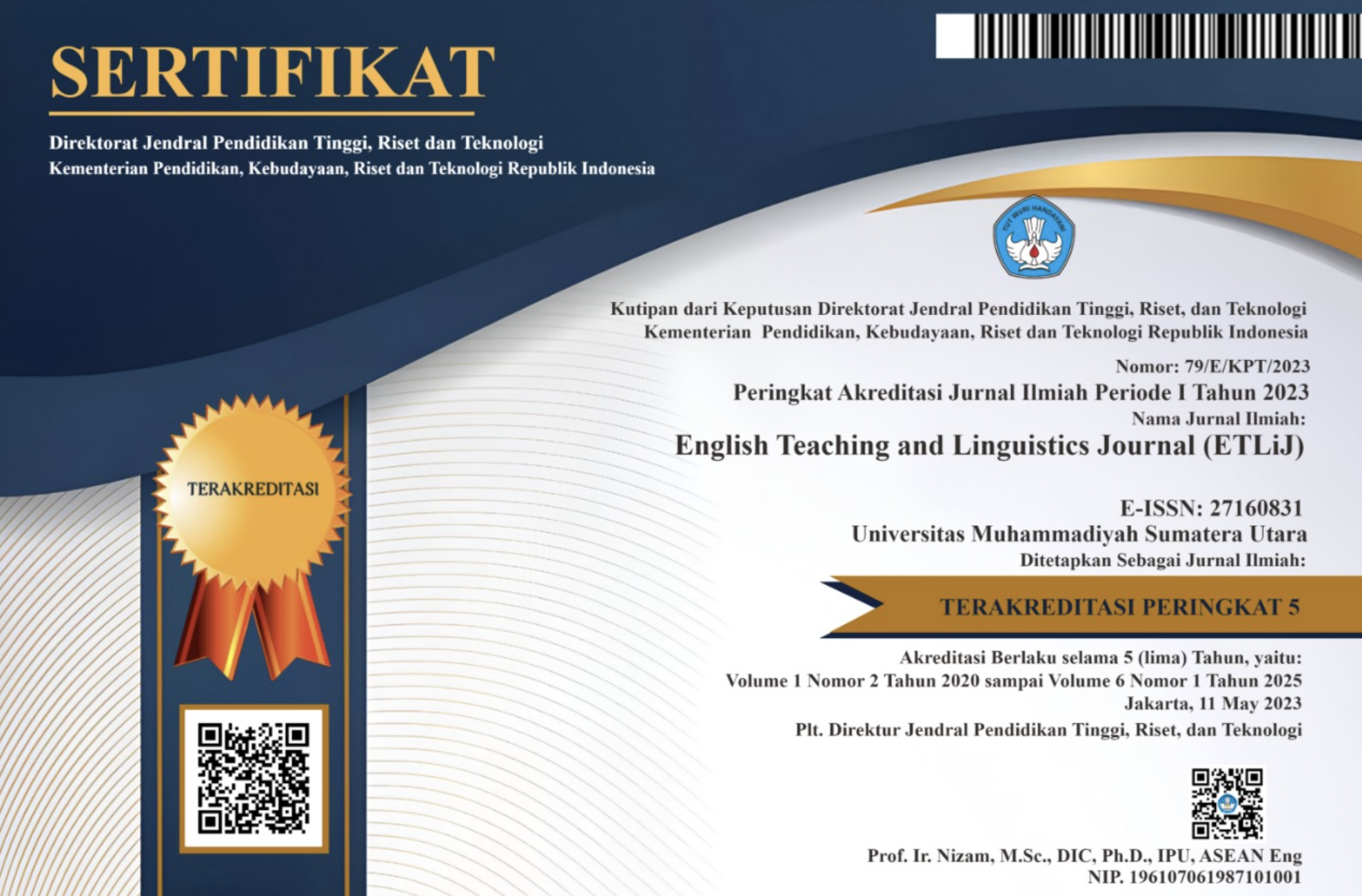ELT in Literature: Using Poetry in Enhancing Students Speaking Performance
Abstract
ELT in literature is one form of teaching integration, which is considered effective way for learner motivation, and a positive atmosphere in learning language. This research presents the study of teaching integration by using poetry as a medium for enhancing students speaking performance. This aims to analyze how the students' performance in English speaking by using poem in literature. The qualitative descriptive method is employed towards research samples from 15 groups students at the Prose and Poetry coursework. Data collection techniques were taken by observing closely towards students' conversation activities by using poetry, which are further analyzed by using Hughes' speaking rubrics, such as fluency, details or understanding, vocabulary, grammar, and pronunciation. The results obtained that the use of poetry as a medium for conversation activity impacts on students' speaking performance, particularly vocabulary, pronunciation, and fluency. In short, this finding is a very interesting way, which can be widely offered in ELT program, such as basic English.
Keywords
Full Text:
PDFReferences
Abdul Majeed CT. (2018). Teaching English Using Programmed Instruction. International Journal of English Language and Literature in Humanities (IJELLH) with IF 5.7, Vol.6, No.4: pp.511-521.
Abilasha R. (2018). Fourth World Literature: A Mouth Piece of Indigenous Languages. World Literature: A Critical Outlook, (2018), pp.1-6.
Anne Picpican Bell (2005), Developing Oral Proficiency Through Poems Recitation in Elementary English as Second Language. A Master Thesis. Faculty of Arts, California State University.
Astuti, Dian Karyani. (2015). The Gap between English Competence & Performance (Performance: The Learners` Speaking Ability). State Islamic Jakarta University, Indonesia.
Christopher D Roebuck. (2015). Impact and Import of Poetry in High School Pedogogy: A Study of Practice and Students Learning. A dissertation submitted Graduate School-State University of New Jersey.
Deepa P. (2018). Activity Based Learning Enhances Speaking Skills with Poetry as a Tool. International Journal of English Language and Literature in Humanities (IJELLH) with IF 5.7, Vol.6 No.4, (2018).
Fatiloro, O. F. (2015). Tackling the Challenges of Teaching English Language as Second Language (ESL) in Nigeria. Journal of Research & Method in Education, 26-30.
Gimpao. (2005). Enhancing Oral Communication Skill through Drama based Activities. Easter University English Language Journal.1. 39-64.
Hadaway, N.L., Vardell, S.M. & Young, T.A. (2001). Literature-based Instruction with English Language Learners. New York: Allyn &Bacon Longman
Haryanto, E., Makmur, Ismiyati, Y., & Aisyah, S. (2018). The Demotivating Factors of English Language Learning among Madrasah Tsanawiah Students: the case of one Madrasah in Jambi City. Jurnal Pendidikan dan Pengajaran , 2503- 2518.
Hismanoglu, M. (2005). Teaching English through literature. Journal of Language and Linguistic Studies, 1(1), 53-66.
Jahbel, K. (2017). Factors Affecting Students Speaking performance at High Schools in Malang. International Journal of English and Education, 242-256.
Jeya, Gowri K. (2018). Application of Theories, Techniques, Methods and Approaches to Develop Second Language Skills A Study based on Transition from Schooling to College, International Journal of Engineering and Technology (IJET), Vol.7, No.3, pp.210-215.
Khan, I. A. (2011). Challenges of Teaching/learning English and Management. Global Journal of Human Social Science, 69-80.
Khan, I. (2011). Learning difficulties in English: diagnosis and pedagogy in Saudi Arabia. International Research Journals, 1248-1257.
Khan, R. M., Radzuan, N. R., Shahbaz, M., Ibrahim, A. H., & Mustafa, G. (2018). Proceedings of the Fourth International seminar on English Language and Teaching learners. Arab World English Journal, 406-418.
Kathryn Michalko (2012), The Effects of Spoken Word Poetry on the Development of Voice in Speaking. Journal of Research on Technology in Education, 34 (3), 336350.
Mazouzi, Salima. 2013. Analysis of some factors affecting learners oral performance. Mohamed Khider University of Biskra, Alger.
Minghe, G., & Yuan, W. (2013). Affective factors in oral English teaching and learning. Canadian Research & Development Center of Sciences and Cultures, 57-61.
Mittal R. (2014). Teaching English through poetry: A powerful medium for learning second language, IOSR Journal of Humanities and Social Science, Vol.19, No.5, pp.21-23.
P. Deepa, M., Ilankumaran. (2018). Teaching Poetry Enhances Speaking Skills An Analysis Based on Select Poems. International Journal of Engineering & Technology, 7 (4.36) (2018) 619-623
Pushpa dan Seyed Yousef. (2014). Teaching Poetry in Autonomous ELT Classes. Social and Behavioral Sciences 98:1919 1925.
Rababah. (2005). Communication problems facing Arab learners of English. Journal of Language and Learning, 3(1), ISSN 1740-4983.
Salkind, N.J. (2006). Exploring Research. 6th Edition, Prince-Hall, Upper Saddle River.
Saputri Dwi Lestari. (2010). Reading Poems as a Strategy to Improve English Pronunciation Ability on Segmental Features and Word Stress. Undergraduate Thesis, Islamic Education And Teachers Training Faculty, Walisongo State Islamic University Semarang.
Songbatumis, A. M. (2017). Challenges in teaching English faced by English teachers at MTsN Taliwang, Indonesia. Journal of foreign language teaching and learning, Vol.2 No. 2.
Sreena S & Ilankumaran M. (2018). Types of Communication Skills and the Ways and Means to Enhance Them. International Journal of English Language and Literature in Humanities (IJELLH), Vol.6, No.4: pp.492-498.
Tuan, N. H., & Mai, T. N. (2015). Factors affecting students speaking performance at le thanh hien high school. Asian Journal of Educational Research, Vol. 3, No. 2.
Vinothees AP. (2018). Importance of Accuracy in Developing English Speaking Skills, International Journal of English Language and Literature in Humanities (IJELLH) with IF 5.7, Vol.6, No.4: pp.143-151.
Zhang et al., 1995). Zhang, X. & Head, K. (2010). Dealing with learner reticence in the speaking class. ELT Journal, 64 (1), 1-9 Al-Sibai, 2004). (Zhang, 2009). Zheng, X. & B. Adamson (2003). The pedagogy of a secondary school teacher of English in the Peoples Republic of China: Challenging the stereotypes. RELC Journal, 34 (3), 323337. (Willis, 1996: p.7).
DOI: https://doi.org/10.30596/etlij.v4i1.12984
Refbacks
- There are currently no refbacks.

This work is licensed under a Creative Commons Attribution 3.0 License
ISSN: 2716-0831





